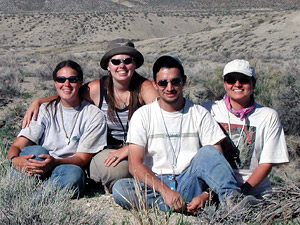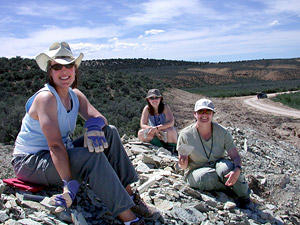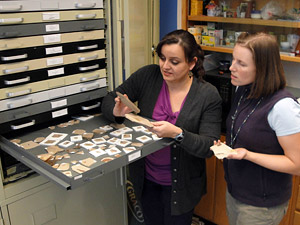 PaleoPeople PaleoPeople
Dena Smith
University of Colorado, Boulder, CO, USA
— Interview conducted September, 2010
Dr. Dena Smith received her Ph.D. from the University of Arizona in Tucson, and is currently an Associate Professor of Geological Sciences at the University of Colorado in Boulder. She is also the Curator of Invertebrate Paleontology at the University's Natural History Museum. Dena's main research focus is on the evolution of insects, with major emphasis on their fossilization, taxonomy, diversity patterns through geologic time, as well as the relationship between insects and climate change. Her research may find her doing large-scale literature-based data collection or out in the field, studying modern ecosystems. She has served as a member of the advisory board of the Paleobiology Database since 2004 and as a councilor for the Paleontological Society; she has co-edited a GSA book on the paleontology of the Florissant Formation and is now the Paleontological Society's webmaster. |
 |


Dena Smith (right) collecting fossil insects in Stewart Valley, Nevada, with (from left) Amanda Cook, Amy Moe, and Cesar Nufio. Photo by Frank Smith.
|
Q: How did you become interested in science?
A: Well … I think I was always interested in science. As a kid, I went through a dinosaur phase. Then I took other paths for awhile. Growing up all I ever heard was that girls and minorities were "not good at science and math" and there were very few role models for me in science. I even had a high school guidance counselor who advised me to not apply to college because as a young Mexican girl, I'd probably just want to get married soon, and I shouldn't waste my time or money. Of course, I applied to college anyway and that's where I got back to science. Although it was intimidating, I still liked it. I actually started as an art major, and I took biology classes so I could learn to be better at drawing organisms. But, I had great mentors who really supported and encouraged me.
Q: What was it about paleontology that struck you as a subject you would like to study?
A: I think the big turning point for me was an internship that I had at the Smithsonian with Scott Wing (a well-known paleobotanist) when I was an undergraduate. He took us out to Wyoming's Big Horn Basin for a few weeks to collect fossil plants. I absolutely loved it — everything about it — the amazing fossils we were finding, being dirty, living in tents! We had been digging trenches one day to get a better look at the sediments and the stratigraphy. At the end of the day, Scott asked me to walk with him and he talked to me about what he could learn from those trenches and the geology of the site. Scott was so excited about the work and I was so impressed with all the information we could learn and how he was able to put it all together. After that summer I went back to school and changed my major!
Also while an undergraduate, I had a really great paleontology professor, Léo Laporte. I just loved his teaching style and I took all of his classes. He also spent lots of quality time with me through a mentorship program at UC Santa Cruz and I really valued that opportunity. He told me, "Dena, if you love it, just do it!" I got an email from Léo after I received tenure, congratulating me and it was great! I always hoped to be able to teach like him. Now I'm a big ham in my classes … just like Léo was!
Q: You're not only a professor, but a researcher and a mom, as well. How do you balance all of these roles?
A: Ahh! It's a challenge and it's hard to remember what I did with all that free time I had before my daughter was born. I think I'm better at organizing my time now that I'm a mom. I'm super-duper organized whether I'm being a mom or a paleontologist, so I can really dive into each role. I make good use of my time at the office and get lots done while I'm there. I don't bring as much home with me because I want my time with my daughter and husband to be great and focused on them. But, we are a science family. My husband studies modern insects and by daughter loves critters; dinosaurs, trilobites and ammonites. So, things are not totally compartmentalized for me. And to be honest, I like mixing things up, I'd get bored doing the same thing every day.


Dena (right) collecting fossil insects in the Green River Formation with Erin Leckey (left) and Amy Moe. Photo by Cesar Nufio.
|  |
Q: What are you focusing your research on now?
A: One of the best things about my job is that I have the freedom to tinker. In my lab there are lots of different things going on — which goes back to my tendency to get bored if I'm only doing one thing! But, I do have two main projects right now. The first is studying how insects become preserved as fossils. Which groups make it into the fossil record? Which parts of insects make it? What are the filters that determine the preservation of insects? I'm really interested in what role the environment plays in insect fossilization — which environments capture what information. This research gives us a good picture of the fossil insect record, and a solid understanding of the data we can use for other research projects.
My second area of research right now is a newer one. I am looking at how insects responded to climate change in the geologic past. I am studying how insects responded to a dramatic global cooling event that occurred in the Eocene (about 50 million years ago) through the Oligocene (about 33 million years ago). Insects are the most diverse group on the planet today, yet very few people have studied them to see how global changes in climate and environment have influenced their evolution. By understanding how insects responded to climate change in the past, we can use insects to help us understand current climate change.
Q: What are your graduate students working on?
A: Some of my students are working on plant-insect interactions, insect fossilization, and even some three dimensionally preserved insects. But, I have a big lab … not everyone is into insects! Some grad students are studying diatoms; some, plants and climate change. There are also projects using dinosaurs in science education. It's exciting! I learn a lot from my students. It's also good for the students. Each one gets to be an expert in their area for the others — they benefit from talking with each other.
Q: What is a typical day like for you?
A: [Laughs] There is no "typical" day! I probably spend more time in meetings than I would like. But the meetings are to help us reach goals that are important to the university or to our discipline. I spend lots of time with students; working on projects, helping with questions and formulating arguments, or just hanging out. If I'm having a bad day, I go to the lab and being with the students always cheers me up! Teaching is really fun. I teach a wide variety of classes. I also work on my own research; reading articles, measuring specimens, running analyses, and writing papers and grants. Sometimes I daydream about summer. Summer is the best. That's when I get to go camping and hunting for fossils.
Q: What project would you love to get into … if you had the time?
A: I have a sabbatical next year, so I've been thinking about this quite a bit. I'm really excited about it! I'm currently working on funding for my fossil beetle database project. The database contains information on beetles from when they first show up in the fossil record (about 245 million years ago) to the present and from all over the world. Through this database we know which beetles showed up when, how they were preserved and where. I'm excited about the questions I can ask once it's all together. That will be the reward for all the hard work and time involved in compiling all this information! I'm excited that I'll have concentrated time to work on it.
 |


Dena (left) and Erin Leckey look at plant and insect fossils in the lab. Photo by Talia Karim.
|
Q: What's the most interesting or exciting thing that has happened to you in your career as a paleontologist?
A: Hmmm … most exciting … there are two things. This is super exciting, but super nerdy! When I was a graduate student I went to Moscow for a fossil insect meeting. The opportunity to go to an international meeting in Russia, to be in a room full of people, from all over the world, who love fossil insects as much as I do … I just loved talking about fossil insects day and night! And to be able to visit Russia and experience a place so different from any other place I have been. It was really amazing!
The other thing is that each summer in the field I find a few amazing, spectacular
fossils that no one has ever seen before. It's like Christmas! Almost everyone
with me in the field finds something magical. The anticipation is wonderful!
Q: Do you have any advice for young people who are interested in paleontology?
A: I'd give them the same advice Léo Laporte gave to me: love it, go for it, and trust that it will all work out. People used to ask what I'd do with my future, studying fossil insects … but look where I am now! I would recommend internships for anyone who is interested in paleontology/science, even if you aren't sure. This is a great way to try out a career path and see if it's for you. Go out in the field with paleontologists. Get to meet people in the field and get a feeling for the "culture" of the field. For me, this made science less scary and made a huge impact on my career path!
Q: Why is paleontology important in today's world?
A: Understanding the history of life is extremely important! The world we live in today — Earth and organisms — is the way it is because of hundreds of millions of years of history. To try to study anything today or make predictions about the future, without an understanding of the past seems pretty pointless. The fossil record provides this amazing dataset of organisms evolving and changing in the context of a world that has been constantly evolving and changing. The fossil record provides the only opportunity to really examine non-human caused extinction and to see how Earth-Life systems really function. Personally, having this broader, historical view of life makes me feel more grounded and connected to everything. We humans, animals, plants, etc. are all a part of this grand evolutionary history together. Today is the chapter we share in the giant book of life. |



